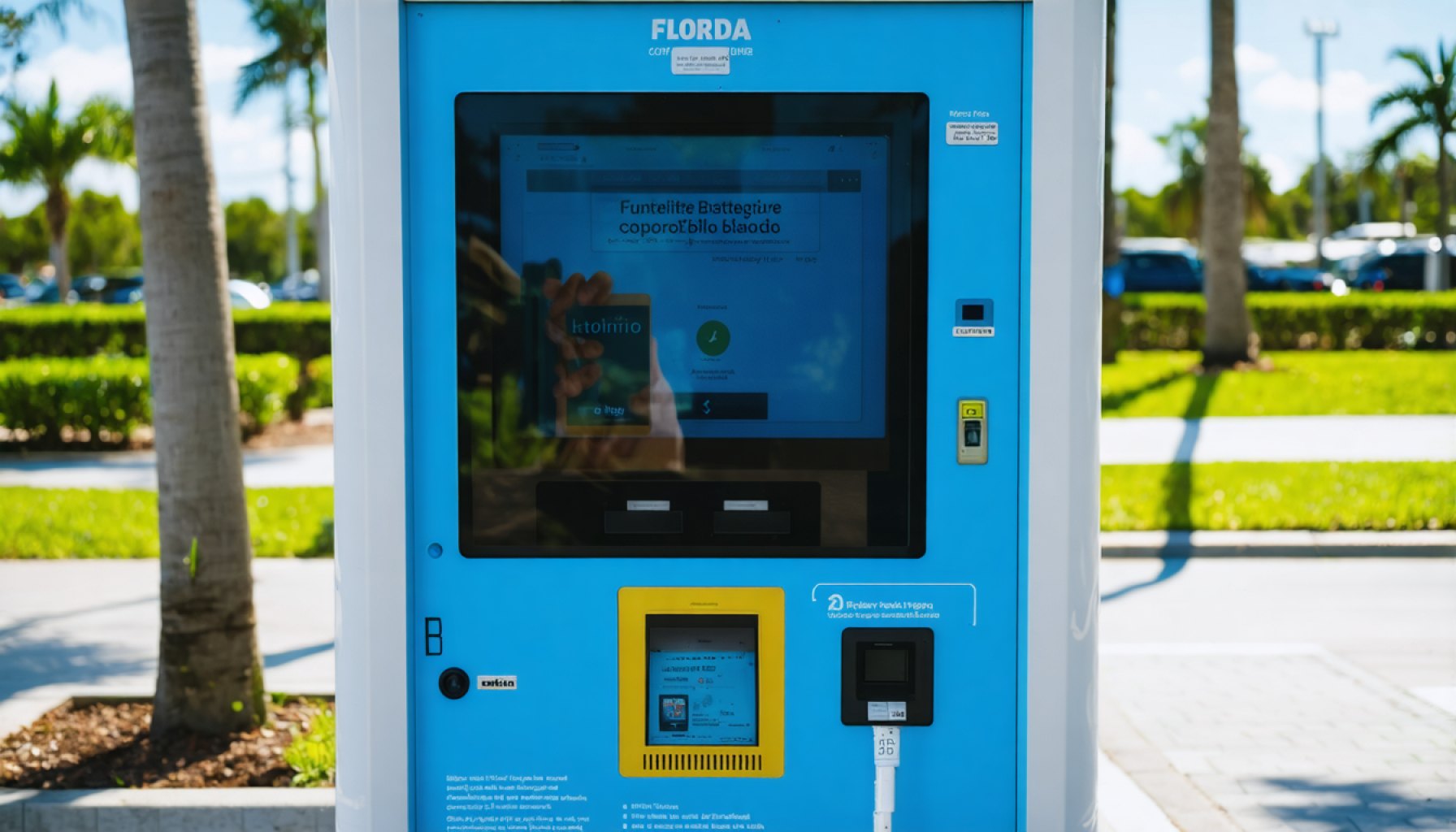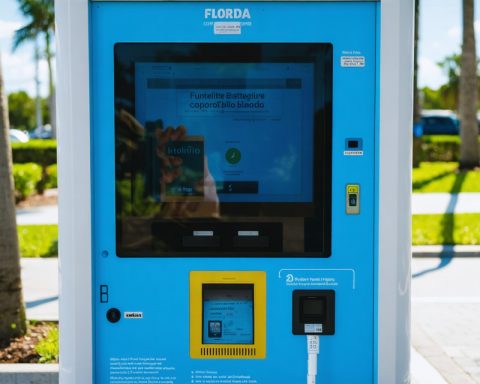- Tallahassee experiences a cryptocurrency surge with the advent of convenient crypto kiosks akin to ATMs.
- House Bill 319 and Senate Bill 292, led by Representative Tom Fabricio, aim to balance innovation with consumer protection through transparency and blockchain analytics.
- Licensing requirements for kiosk operators are proposed to enhance oversight and accountability, fostering trust in financial transactions.
- Real-time support for users, via phone or chat, is suggested to prevent user errors from leading to larger financial issues.
- The initiative aims to benefit local businesses and boost economic activity without compromising public safety.
- Florida’s legislative actions could set a precedent for crypto regulation, balancing expansion and prudence in the digital frontier.
Tallahassee’s sun-drenched streets are no stranger to waves of change, but few are as electrifying—or as divisive—as the cryptocurrency boom. Floridians are increasingly drawn to the allure of decentralized finance, and with it, the convenience of crypto kiosks popping up across the state. These unassuming machines, reminiscent of ATMs, allow users to exchange digital currency for cash in the blink of an eye. Yet, this surge in accessibility brings its own set of challenges that state lawmakers are keen to address.
Enter House Bill 319 and Senate Bill 292, put forward by Representative Tom Fabricio and his Senate counterparts. These legislative efforts aim to strike a delicate balance between fostering innovation and ensuring consumer protection. The proposed bills have gained momentum by focusing on the essentials: transparency in fees and refined blockchain analytics to thwart fraud and unauthorized transactions.
However, a deeper dive into the crypto world reveals further avenues for safeguarding both users and operators. Licensing requirements for kiosk operators are one such measure that could enhance oversight and bolster accountability. After all, trust is the cornerstone of any financial transaction. By mandating licenses, Florida could set a precedent in enforcing responsible operations without stifling entrepreneurial spirit.
But there’s another layer to this dialogue—real-time support for users. Picture this: a crypto newbie loses funds during a transaction due to a flawed input. A support line, accessible via phone or chat, could alleviate such distress almost instantly, preventing small mishaps from spiraling into larger financial losses. While several kiosk companies proactively incorporate such assistance, a statewide mandate would elevate the standard service across every machine, akin to pulling the veil off a safety net.
This is not merely about business operation; it’s about sustaining an ecosystem that directly benefits the community, from bustling convenience stores to mom-and-pop gas stations drawing more foot traffic, courtesy of these digital transactions. As the legislature deliberates, the burden falls upon them to ensure that economic innovation does not sacrifice the safety of its citizens.
The crux of the matter lies in measured action—encouraging this digital frontier while embedding safeguards that prioritize public trust. In doing so, Florida’s lawmakers have the chance to offer a template for crypto engagement that other states may well follow.
Amidst this booming narrative, the heart of the matter remains simple: Expand the horizons but ground them in prudence. If executed correctly, the integration of regulation and innovation in Florida’s crypto kiosk industry could very well serve as a beacon for responsible growth throughout the broader crypto economy.
Cryptocurrency Kiosks: Revolutionizing Finance or Risking Consumer Safety?
The Rise of Cryptocurrency Kiosks in Florida
As the popularity of cryptocurrencies soars, the landscape of finance in states like Florida is rapidly transforming. Cryptocurrency kiosks, akin to ATMs, are becoming ubiquitous, providing a convenient nexus for Floridians to swap fiat money for digital currencies. However, this surge in accessibility invites both exciting opportunities and significant challenges, prompting legislative scrutiny.
Legislative Measures: Balancing Innovation and Consumer Safety
In response to this burgeoning trend, Florida’s House Bill 319 and Senate Bill 292 are laying the groundwork for regulatory frameworks that prioritize transparency and consumer protection. Spearheaded by Representative Tom Fabricio, these bills focus on:
– Fee Transparency: Ensuring users are fully informed of transaction costs.
– Enhanced Blockchain Analytics: Minimizing fraudulent activities through refined fraud detection mechanisms.
Yet, these bills are just the tip of the iceberg in safeguarding consumers in the volatile cryptocurrency space.
Additional Measures for Enhanced Security
Beyond the proposed legislation, other avenues exist to fortify the trust framework for crypto kiosk users:
1. Licensing Requirements: Mandating licenses for kiosk operators could significantly enhance oversight. Licensing would ensure that these entities adhere to high standards of financial operation, bolstering public trust.
2. Real-time Customer Support: Mistakes in cryptocurrency transactions can lead to irreversible financial losses. Establishing mandated, real-time customer support services, accessible via phone or chat, would provide immediate assistance to users facing transaction issues.
Impacts on Local Businesses and Economy
The introduction of crypto kiosks doesn’t merely affect individual users; it has a broader economic impact. Local businesses, such as convenience stores and gas stations, benefit from increased foot traffic as consumers access these kiosks. This, in turn, stimulates local economies and fosters a tech-forward business environment.
Controversies and Limitations
Despite the benefits, crypto kiosks are not without their challenges:
– Security Risks: Cryptocurrency transactions, by nature, are susceptible to hacking and fraud. There’s a pressing need for robust cybersecurity measures to protect sensitive user information.
– Volatility: The fluctuating value of digital currencies poses investment risks, often deterring cautious investors.
Insights and Predictions for the Future
The trajectory for cryptocurrency kiosks in Florida—and potentially nationwide—is poised for exciting growth. If legislation keeps pace with technological advancements, there’s potential for:
– Increased Adoption: With clear guidelines and consumer protections, more individuals are likely to engage in cryptocurrency transactions, driving mainstream acceptance.
– Statewide Transformation: Florida could emerge as a model for other states, demonstrating how regulation and innovation can coexist to nurture a thriving crypto economy.
Actionable Recommendations
For users interested in engaging with cryptocurrency kiosks, consider the following tips:
– Stay Informed: Understand the fees and risks associated with each transaction.
– Utilize Support Services: When available, leverage real-time support to resolve any issues swiftly.
– Secure Your Assets: Always use secure platforms and protect your digital wallets with strong passwords and two-factor authentication.
For more insights on financial innovations, visit Forbes.
By navigating the complex interplay of innovation and safety, Florida stands on the cusp of an exciting new economic chapter.














